When You Recite the Creed
A short video on why you shouldn't just say the Creed, you should pray the Creed.
202 results
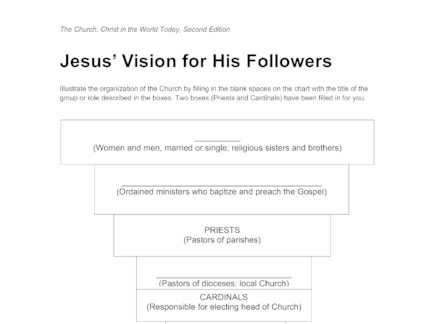
This activity asks students to illustrate the organization of the Church by filling in the title of the group or role described in each box.
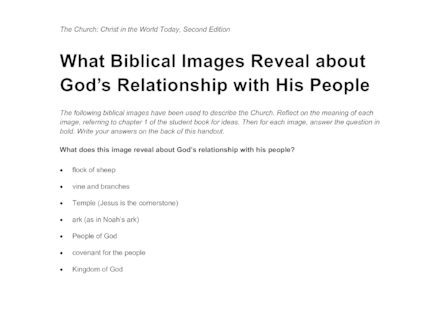
Students will examine seven different images of God’s people used in the Bible, and describe what each image reveals about God’s relationship with his people.
The video "The Day of the Dead," available on YouTube (3:49), offers a good overview of the Mexican celebration for the "Day of the Dead" activity on day 4.
The video "C4: Ignite Your Catholic Faith—What Are the Marks of the Church?" is available on YouTube (3:32), and is used for the "On Your Marks" activity on day 1.
The video "Introduction to the Liturgy of the Eucharist," by dioceseofstpete, available on YouTube (1:50), offers an overview of material presented in the Handbook. It is especially helpful for day 1, but would be effective on any day.
The video "Precepts of the Church," by Saint Mary’s Press, available on YouTube (0:51), is an option for day 4.
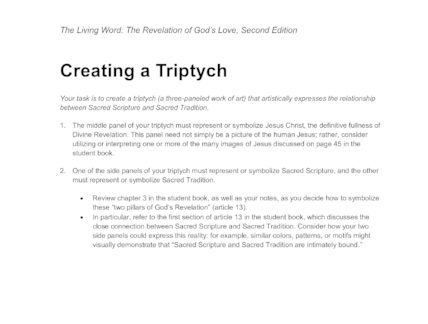
This is a description for an art project where students express the relationship between Sacred Scripture and Sacred Tradition.
This PowerPoint accompanies Unit 5, Chapter 13, by discussing more deeply the meaning of faith and its connection to religion and belief.
This PowerPoint accompanies Unit 3, Chapter 8, by discussing Jesus’ presence in Church history and today.
This PowerPoint accompanies Unit 2, Chapter 4, by discussing the revelation of God through Scripture and Tradition.
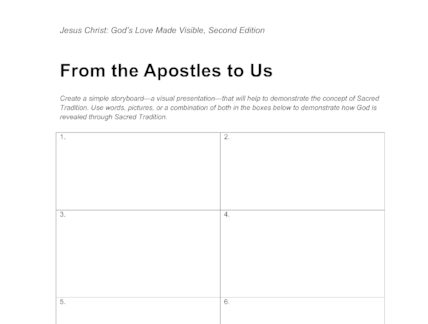
Students create a storyboard to show how God is revealed in Sacred Tradition.
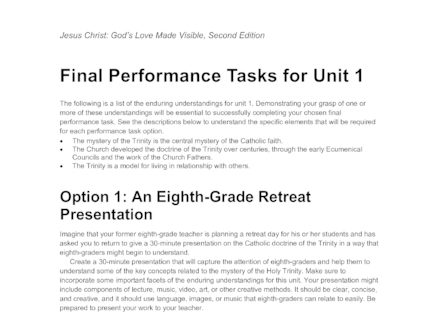
Two possible projects to assess student understanding of concepts learned in Unit 1.
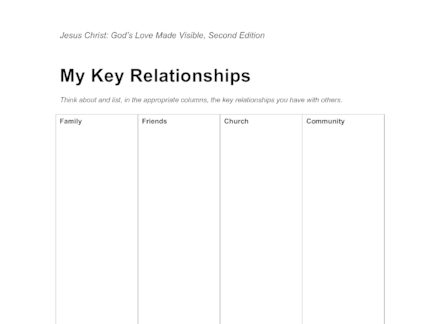
This handout provides a chart for students to list key relationships that are from their church, community, family, and friends.
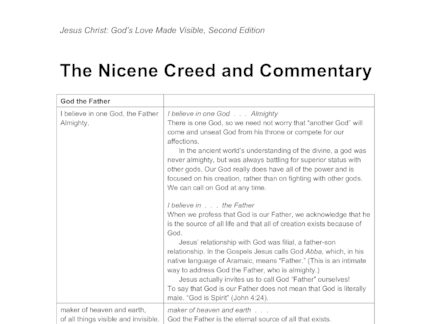
This handout breaks down the Nicene Creed line-by-line and gives each a brief explanation and commentary.
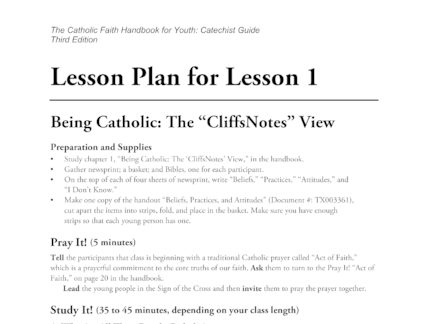
A lesson plan for lesson 1 in The Catholic faith Handbook for Youth: Catechist Guide. This lesson plan challenges students to identify why they are Catholic and the core beliefs, practices, and attitudes of Catholicism
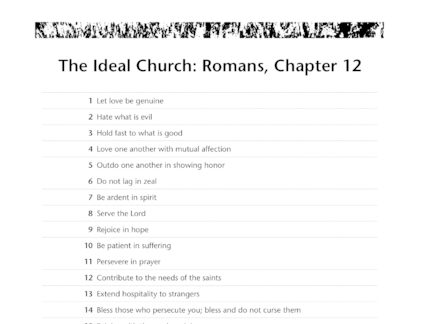
This handout lists 26 objectives of the ideal church as presented in Romans, Chapter 12
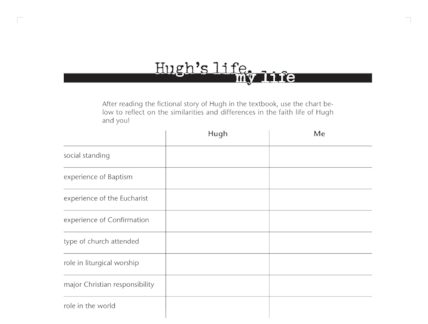
After reading the fictional story of Hugh in the textbook, use the chart below to reflect on the similarities and differences in the faith life of Hugh and you!
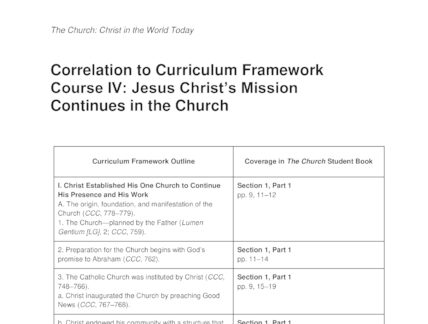
Correlation to Curriculum Framework Course IV: Jesus Christ’s Mission Continues in the Church from The Church: Christ in the World Today.
A personal story about discovering how Catholicism is truly universal.
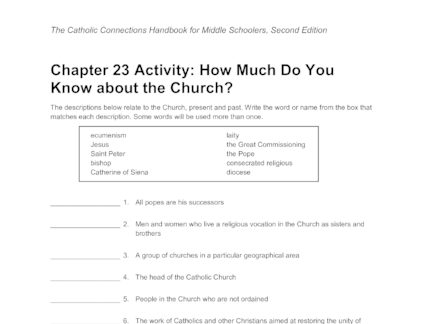
The descriptions below relate to the Church, present and past. Write the word or name from the box that matches each description. Some words will be used more than once.
A personal story about seeing the Church as a wise elder sitting on a porch.
A PowerPoint on The Catholic Faith Handbook for Youth, Third Edition Chapter 14, The Organization of the Catholic Church.
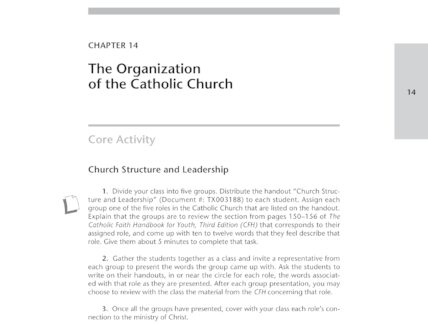
Activities for Chapter 14 The Organization of the Catholic Church, including a core activity, core activity extension, and additional activities.
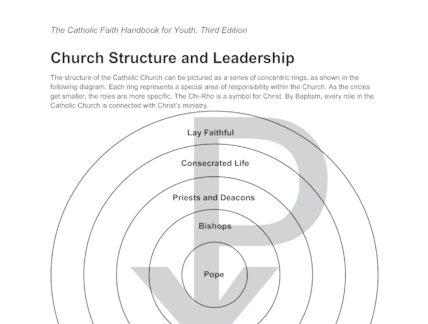
The structure of the Catholic Church can be pictured as a series of concentric rings, as shown in the following diagram. Each ring represents a special area of responsibility within the Church. As the circles get smaller, the roles are …
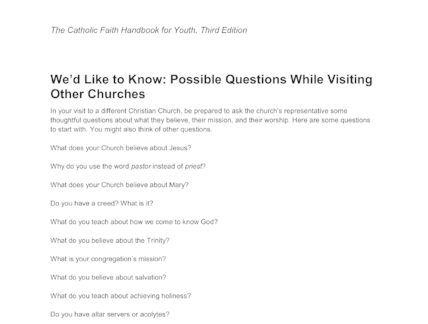
In your visit to a different Christian Church, be prepared to ask the church’s representative some thoughtful questions about what they believe, their mission, and their worship. Here are some questions to start with. You might also think of other …
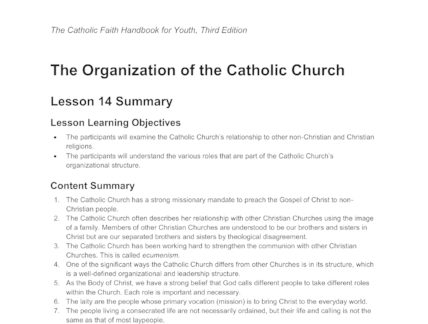
The lesson learning objectives and content summary for Lesson 14, The Organization of The Catholic Church
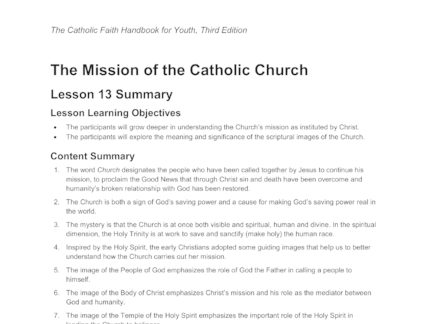
The lesson learning objectives and content summary for Lesson 13, The Mission of the Catholic Church.
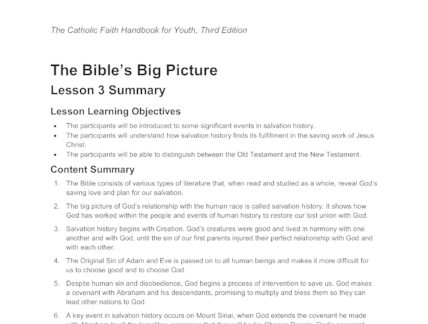
The lesson learning objectives and content summary for Lesson 3, The Bible’s Big Picture.
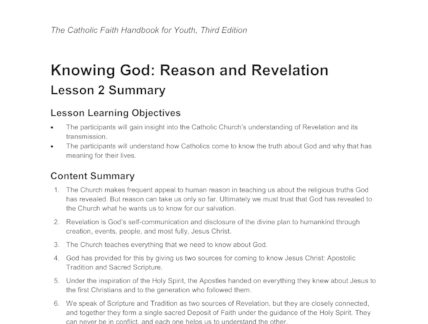
The lesson learning objectives and content summary for Lesson 2, Knowing God: Reason and Revelation.
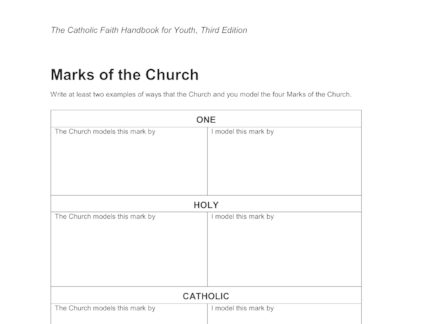
Write at least two examples of ways that the Church and you model the four Marks of the Church.
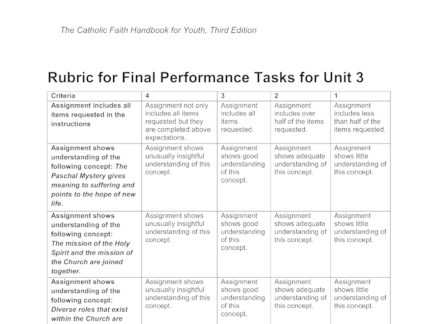
A rubric for the final performance task options for Unit 3 focusing on the Paschal Mystery, the Holy Spirit and the Church, and the mission of the Church. The options include exploring one important ministry in a diverse Church, creating …
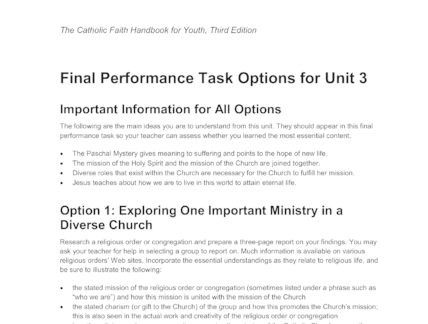
The final performance task options for Unit 3 focusing on the Paschal Mystery, the Holy Spirit and the Church, and the mission of the Church. The options include exploring one important ministry in a diverse Church, creating a poster comparing …
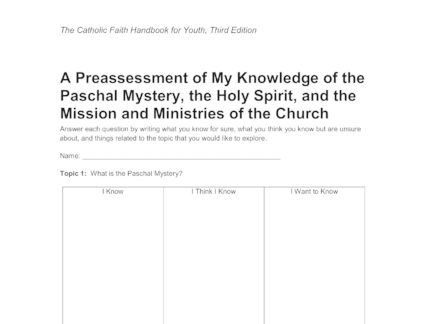
Answer each question by writing what you know for sure, what you think you know but are unsure about, and things related to the topic that you would like to explore.
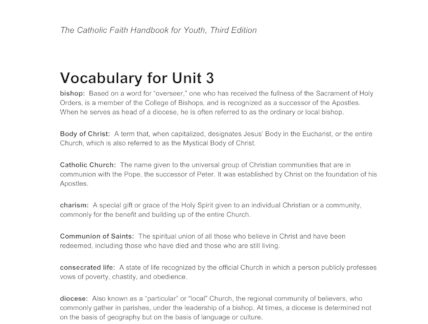
A list of vocabulary words for Unit 3 that defines the terms bishop, Body of Christ, Catholic Church, charism, Communion of Saints, consecrated life, diocese, doctrine, Final Judgment, fruits of the Holy Spirit, Gifts of the Holy Spirit, laity, Marks …
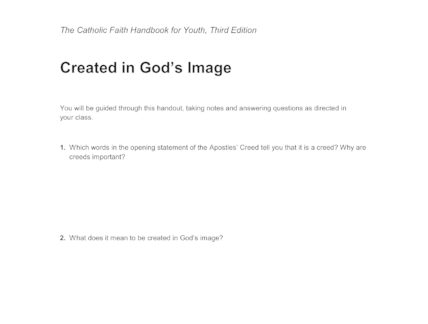
You will be guided through this handout, taking notes and answering questions as directed in your class.
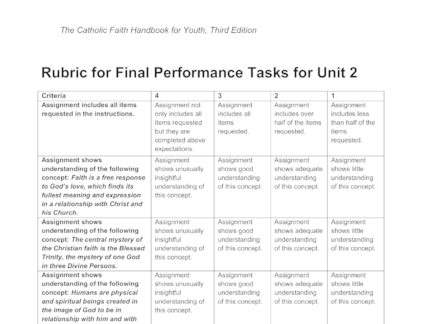
Rubric for grading the final performance tasks for Unit 2 focusing on faith, the Trinity, the Kingdom of God, and creation in the image of God. The options include writing a personal creed, creating a Holy Trinity play, or exploring …
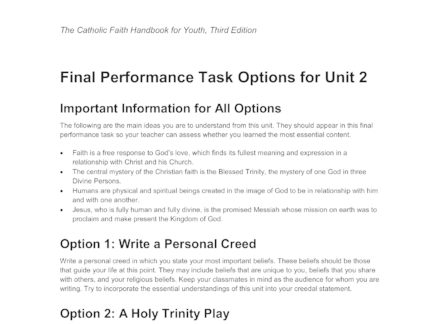
Options of final performance tasks for Unit 2 focusing on faith, the Trinity, the Kingdom of God, and creation in the image of God. The options include writing a personal creed, creating a Holy Trinity play, or exploring three Kingdom …
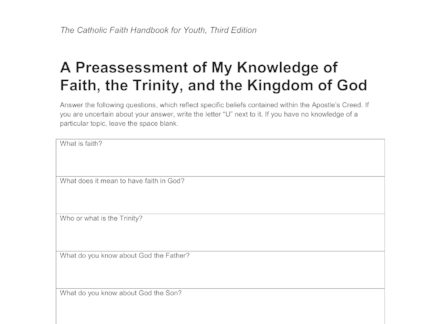
Answer the following questions, which reflect specific beliefs contained within the Apostle’s Creed. If you are uncertain about your answer, write the letter “U” next to it. If you have no knowledge of a particular topic, leave the space blank.
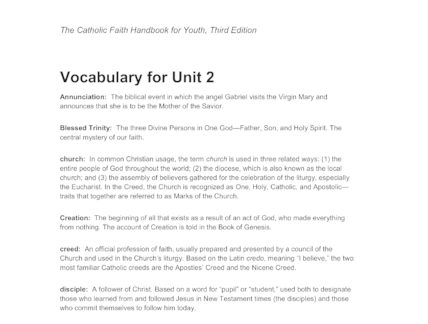
A list of vocabulary words for Unit 2 including Annunciation, Blessed Trinity, church, Creation, creed, disciple, ecumenism, evangelist, faith, Gospel, Incarnation, Kingdom of God, Messiah, ministry, Original Sin, parable, Paschal Mystery, salvation, stewardship, and Theotokos.
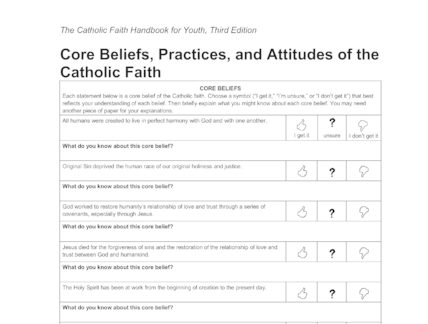
Each statement below is a core belief of the Catholic faith. Choose a symbol (“I get it,” “I’m unsure,” or “I don’t get it”) that best reflects your understanding of each belief. Then briefly explain what you might know about …
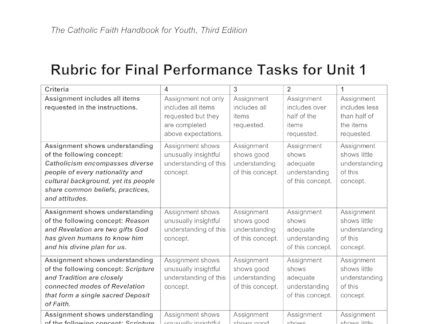
A rubric for the final performance tasks for Unit One about the basics of Catholicism, Scripture and Tradition, and Reason and Revelation. The options include reflecting on the Catholic faith in an essay, writing a personal story about your salvation …
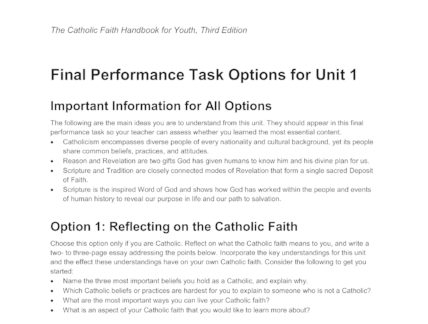
Options of final performance tasks for Unit One about the basics of Catholicism, Scripture and Tradition, and Reason and Revelation. The options include reflecting on the Catholic faith in an essay, writing a personal story about your salvation history, or …
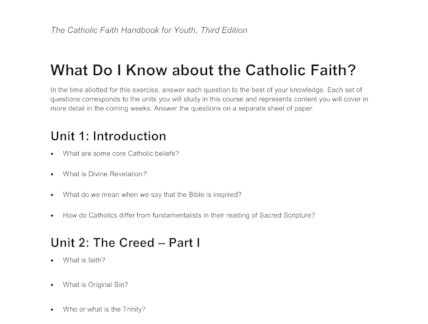
In the time allotted for this exercise, answer each question to the best of your knowledge. Each set of questions corresponds to the units you will study in this course and represents content you will cover in more detail in …
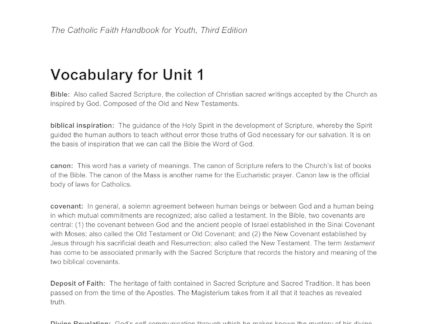
A list of vocabulary words for unit one, defines the terms Bible, biblical inspiration, canon, covenant, Deposit of Faith, Divine Revelation, Ecumenical Council, Gospel, inerrancy, Israelites, Law, Magisterium, natural revelation, New Testament, Old Testament, Parousia, reason, Sacred Scripture, Sacred Tradition, …
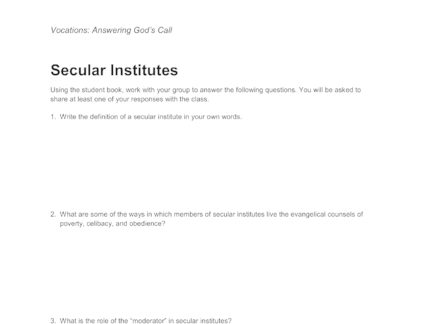
A worksheet completed in groups about the history, role, and characteristics of secular institutes.
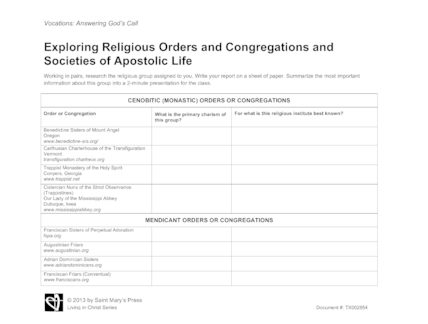
A research assignment worksheet done in pairs to find important information about different religious orders.
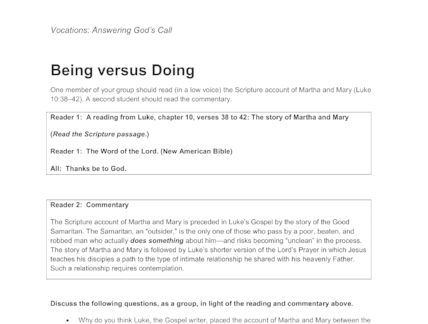
A scripture passage from the Gospel of Luke about Martha and Mary is read along with a commentary, and is followed by large group discussion questions.
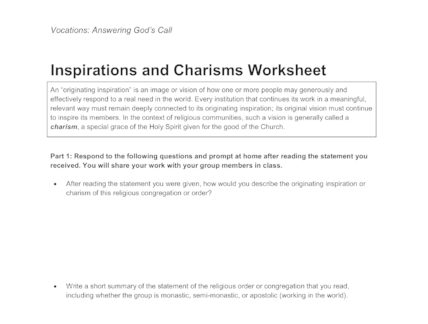
A partially independent and partially group completed worksheet for students to fill out about the inspirations and charisms of a particular religious congregation or order.
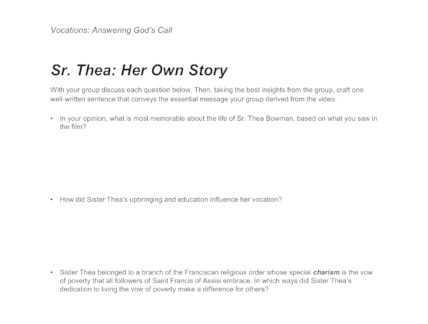
A list of discussion questions from the video Sr. Thea: Her Own Story.
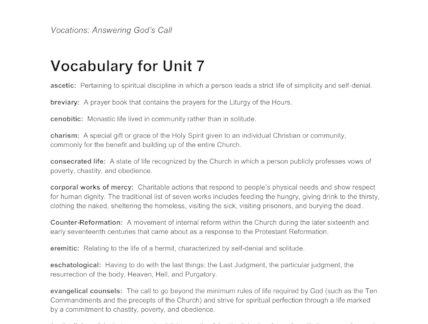
A vocabulary list for unit 7 defining terms associated with consecrated life.
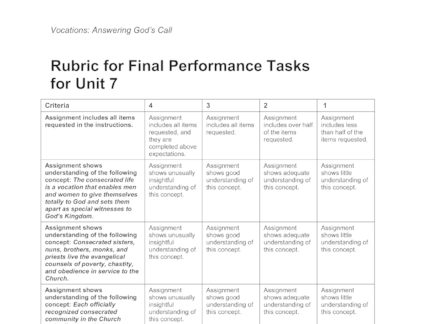
A rubric assessing how well students did on the final performance task options for unit 7 that assess the students’ knowledge of consecrated life. The options include writing a biographical essay about a woman or a man who chose the …
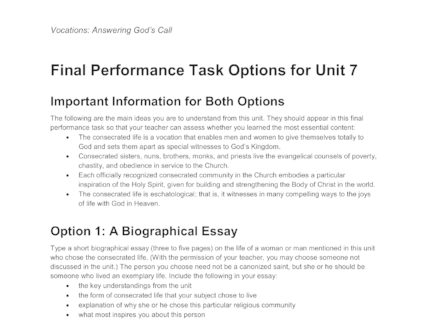
Final performance task options for unit 7 that assess the students’ knowledge of consecrated life. The options include writing a biographical essay about a woman or a man who chose the consecrated life, or giving an oral presentation on a …
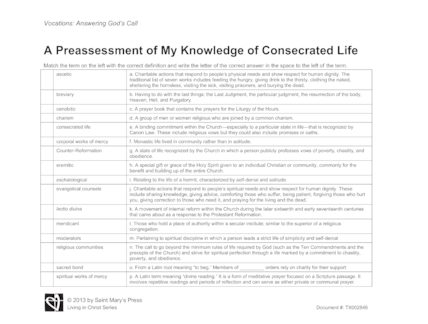
A preassessment for students about their knowledge of terms associated with consecrated life.
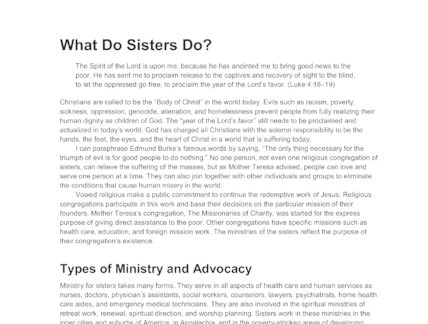
An article that discusses the roles and responsibilities of religious sisters.
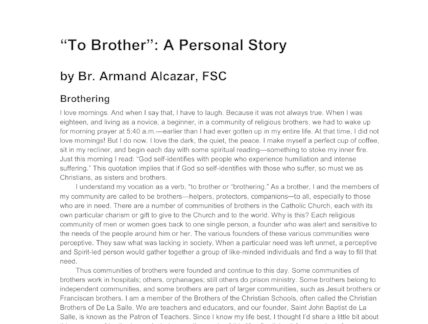
An article written by Br. Armand Alcazar FSC, who discusses his view of his vocation as a verb, “to brother”, or “brothering” in teaching and community life.
A PowerPoint about a priest’s formation through their family, discernment, the vocations director, minor seminary, and theology studies.
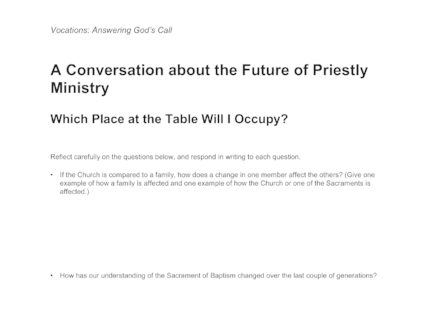
A worksheet with questions about the future of priestly ministry.
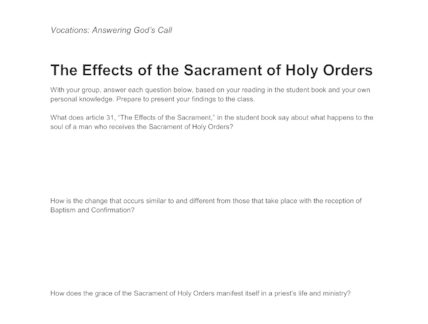
A worksheet completed in groups about the effects of the Sacrament of Holy Orders from both the book and the student’s personal knowledge.
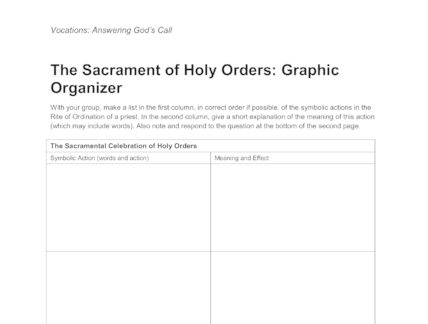
A worksheet completed in groups about the symbolic words and actions that take place during the Rite of Ordination, as well as their meaning and effect.
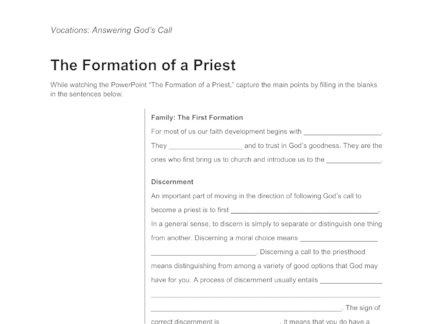
While watching the PowerPoint “The Formation of a Priest”, the students must fill out this worksheet by filling in the blanks.
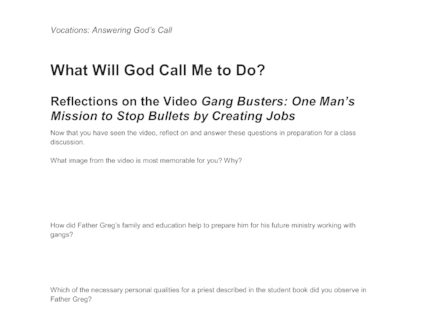
A reflection worksheet and class discussion on the video Gang Busters: One Man’s Mission to Stop Bullets by Creating Jobs.
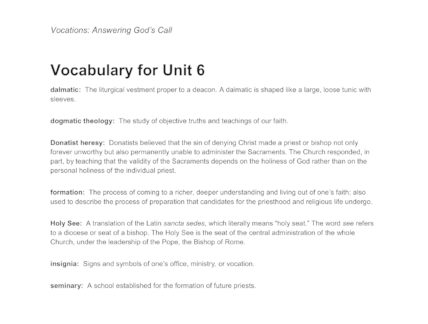
A vocabulary list for unit 6 defining the terms dalmatic, dogmatic theology, Donatist heresy, formation, Holy See, insignia, and seminary.
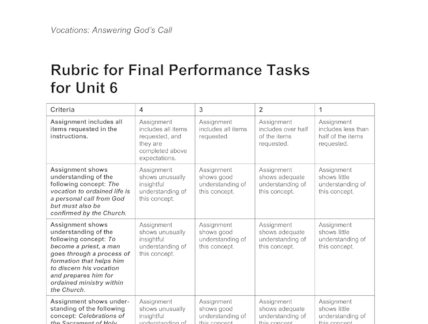
A rubric for grading the final performance tasks for unit 6 focusing on the vocation to ordained life and the Sacrament of Holy Orders. The options for final performance tasks include creating a brochure on priestly formation for prospective candidates, …
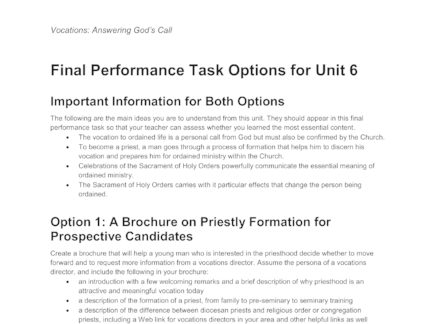
Options for final performance tasks for unit 6 focusing on the vocation to ordained life and the Sacrament of Holy Orders. The options for final performance tasks include creating a brochure on priestly formation for prospective candidates, or writing a …
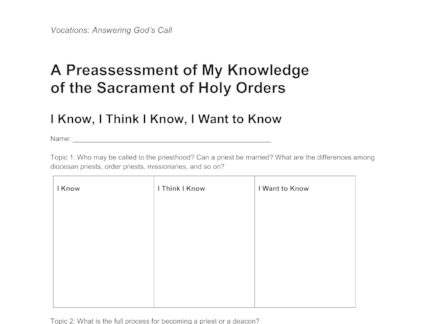
A preassessment about things that a student already knows, thinks that they know, and wants to know about the Sacrament of Holy Orders.
<p>A PowerPoint about the roles of Deacons, Priests, and Bishops within the Catholic Church.</p>
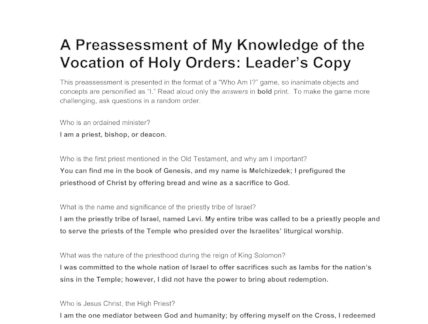
A preassessment of one’s knowledge of terms and concepts associated with the Vocation of Holy Orders.
A short explanation of John 3:16, discussing justification by faith versus salvation as a gift.
A brief explanation of God's presence, or lack thereof, in Purgatory and Hell.
A video explaining the assassination attempt on Pope Saint John Paul II's life.
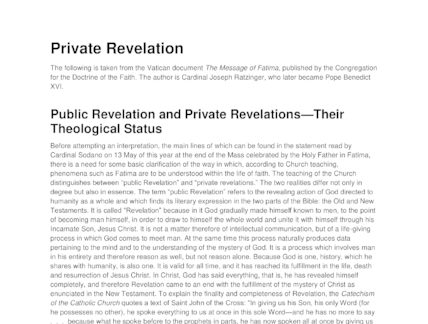
A reading taken from the Vatican document "The Message of Fatima", published by the Congregation for the Doctrine of the Faith. The author is Cardinal Joseph Ratzinger, who later became Pope Benedict XVI.
A short video on why you shouldn't just say the Creed, you should pray the Creed.
A short video on how the Church is good, even though there have been bad popes.
A video clip of Pope Francis stopping to bless a man with a disability.
A short video clip that explains what happens when a pope leaves his post, either through death or resignation.
A short video clip outlining the life and works of Pope Emeritus Benedict XVI
A video on Saint Francis of Assisi, and why Pope Francis chose his name.
A video on the life of Cardinal Jorge Mario Bergoglio, who became Pope Francis.
The first Pope of the Americas Jorge Mario Bergoglio hails from Argentina. The 76-year-old Jesuit Archbishop of Buenos Aires is a prominent figure throughout the continent, yet remains a simple pastor who is deeply loved by his diocese, throughout which …
Cardinal Jorge Mario Bergoglio, S.J., Archbishop of Buenos Aires, Argentina, Ordinary for Eastern-rite faithful in Argentina who lack an Ordinary of their own rite, was born on 17 December 1936 in Buenos Aires. He studied as and holds a degree …
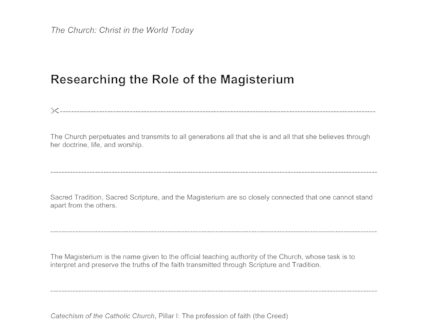
Several strips of paper that may come in handy when researching the role of the Magisterium.
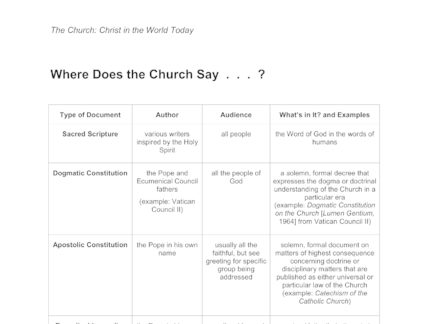
A chart outlining different types of Church documents, the author and audience of each particular document, and what’s in each document.
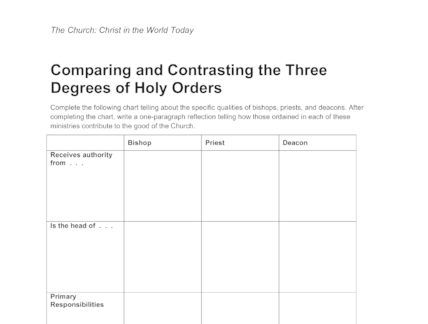
A chart that compares and contrasts the specific qualities of bishops, priests, and deacons.
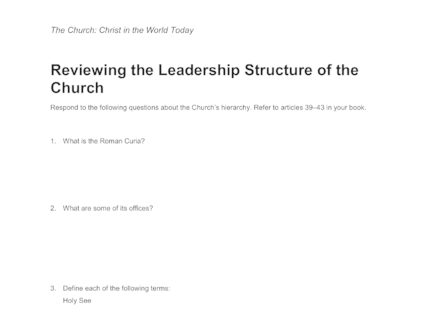
A number of questions on the leadership structure of the Church.
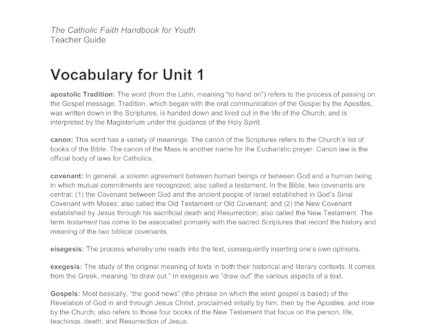
Vocabulary terms and definitions for Unit 1 of “The Catholic Faith Handbook for Youth.”
A PowerPoint presentation on the levels of authority in Church teaching.
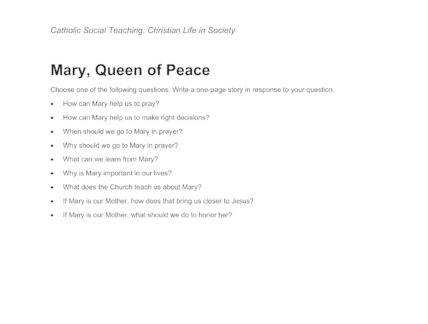
A list of several questions regarding the Blessed Virgin Mary that can be used as writing or reflection prompts.
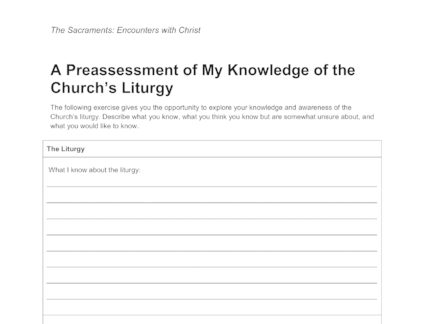
A preassessment of knowledge on the Church's Liturgy.
A movie chronicling the entire life of Pope Saint John Paul II.
A movie chronicling the entire life of Pope Saint John Paul II.
A movie chronicling the entire life of Pope Saint John Paul II.
A movie chronicling the entire life of Pope Saint John Paul II.
A movie chronicling the entire life of Pope Saint John Paul II.
A movie chronicling the entire life of Pope Saint John Paul II.
A movie chronicling the entire life of Pope Saint John Paul II.
A movie chronicling the entire life of Pope Saint John Paul II.
A movie chronicling the entire life of Pope Saint John Paul II.
A documentary discussing the historical/theological precedents for celibacy.
A documentary that provides: 1) A theological basis for the Eucharist, 2) An explanation of precisely what transpires during the Eucharist, 3) The process by which the bread of the Eucharist is created and 4) An instance of a Eucharistic …
A documentary discussing the traits of a possessed individual and the means by which a priest will exorcise the individual.
A documentary detailing the development of the Papacy, the Pope's role in the Catholic Church, and the process by which a Pope is selected.
A documentary providing a definition of Sainthood, descriptions of the lives of a number of Saints, miracles performed by the Saints, and the comprehensive process whereby an individual is declared a Saint by the Catholic Church.
An overview of the many Marian apparitions and their significance.
Explains how priests were formed in the early stages of Christianity.
Discusses the instances, credibility, and significance of the Stigmata.
A documentary discussing sin, its manifestations, its history, and the ways in which Christianity is a response to it.
An explanation of the various gifts of the Holy Spirit and the way in which they help the church.
This documentary discusses conceptions of the afterlife and explains the historical basis for and characteristics of heaven, hell, and purgatory.
Provides a description of the theology and historical basis for the existence of Angels and demons.
An explanation of the apocalypse as discussed in the book of Revelation.
A documentary discussing the integral and often contentious role of women, past and present, in the Catholic Church. Note: Viewing begins at 1:01.
A cinematographically excellent documentary explaining in colloquial and relatable language the unexpectedly amicable relationship between science and Christianity.
A cinematographically excellent documentary explaining in colloquial and relatable language the Church's understanding of creation and its attitudes towards science and evolution.
A cinematographically excellent documentary explaining in colloquial and relatable language the history of the development of many Christian denominations.
A cinematographically excellent documentary explaining in colloquial and relatable language the signifiance of art for the representation of Jesus.
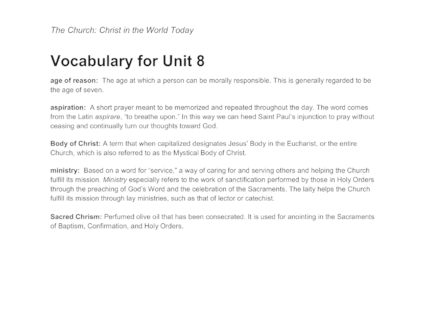
This vocabulary list is part of the Living in Christ Series. Students may use it as a reference for key theological terms to know.
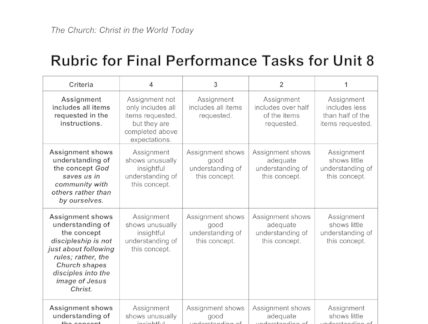
This rubric is part of the Living in Christ Series. It serves as a guide for assessing students on projects about the Catholic Church, especially the role of community and sacraments in salvation.
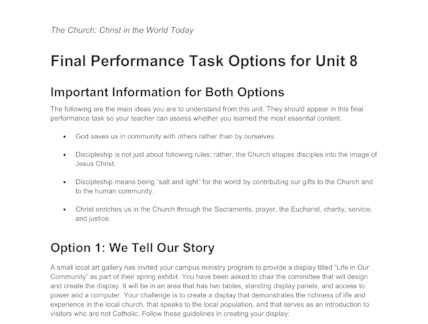
This resource is from the Living in Christ Series. It offers various project ideas for students who are or have been studying ecclesiology, especially, the role of community, prayer, and discipleship in the Church.
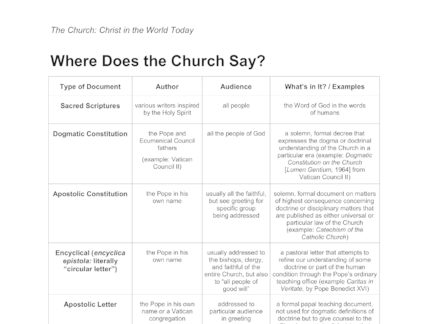
This handout is part of the Living in Christ Series. It is a good resource for identifying the differences between various Church documents.
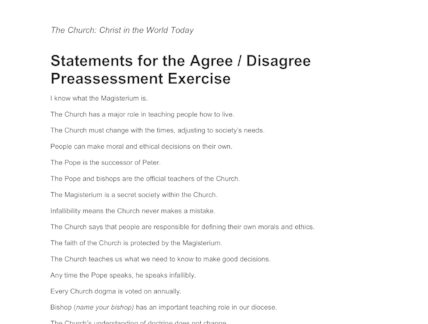
This activity is part of the Living in Christ Series. Students may 'agree' or 'disagree' with various statements about the Church as a way to preassess the class.
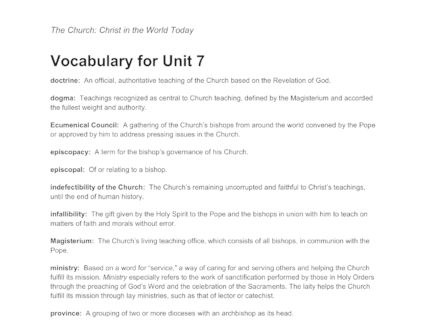
This vocabulary list is part of the Living in Christ Series. Students may use it as a reference for key theological terms to know.
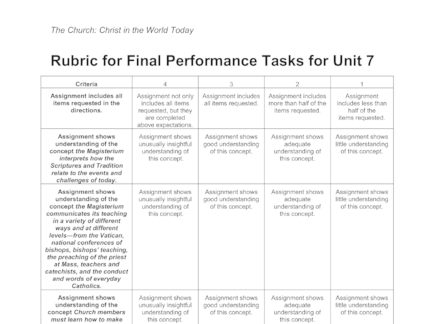
This rubric is part of the Living in Christ Series. It serves as a guide for assessing students on projects about the Catholic Church, especially the teaching authorities and roles of various members.
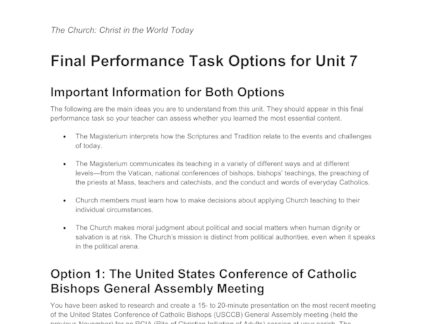
This resouce is part of the Living in Christ Series. It offers various project ideas for students who are or have been studying ecclesiology, especially the role of the Magisterium on matter of faith and morals.
This PowerPoint is part of the Living in Christ Series. It offers a series of statements to which students must strongly agree, agree, disagree, or strongly disagree. This helps the teacher gain insight into the level of knowledge of his or her students.
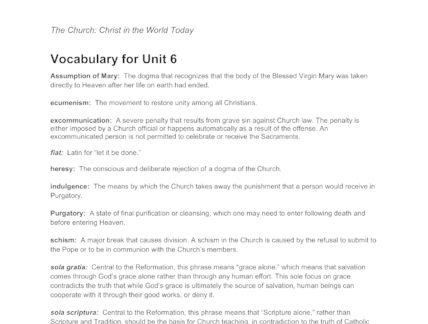
This vocabulary list is part of the Living in Christ Series. Students may use it as a reference for key theological terms to know.
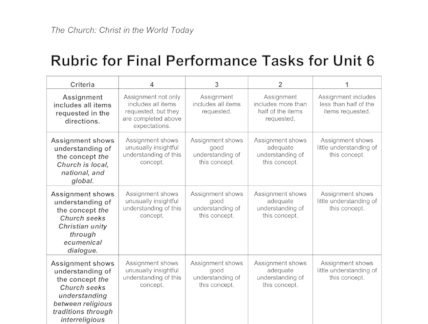
This rubric is part of the Living in Christ Series. It serves as a guide for assessing students on projects about the Catholic Church, especially its relationship with other Christian church and other religions.
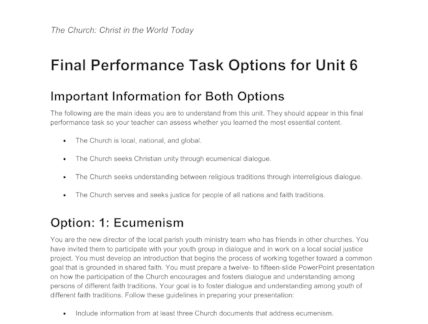
This resource is part of the Living in Christ Series. It offers various project ideas for students who have recently studied ecclesiology, especially ecumenism and interreligious dialogue.
This PowerPoint is part of the Living in Christ Series. It discusses the Church in the modern world, including contentious moral issues, politics, and evangelization.
This PowerPoint is part of the Living in Christ Series. It presents information on the "Domestic Church", that is, the Christian home and family.
<p>This PowerPoint is part of the Living in Christ Series. It explores in detail the four marks of the Church: One, Holy, Catholic and Apostolic.</p>
This PowerPoint is part of the Living in Christ Series. It explores and explains the Church's two natures, both visible and spiritual, through examples and extensive reference to the Catechism of the Catholic Church.
This PowerPoint is part of the Living in Christ Series. It discusses the origin, mission, and features of the Catholic Church, from the time of the Apostles to today.
<p>This PowerPoint is part of the Living in Christ Series. It explores the five models of the Church as Mystical Body/Communion, Herald, Sacrament, Servant and Institution.</p>
This PowerPoint is part of the Living in Christ Series. It uses language and images from the New Testament to highlight the relationship between God and the Church.
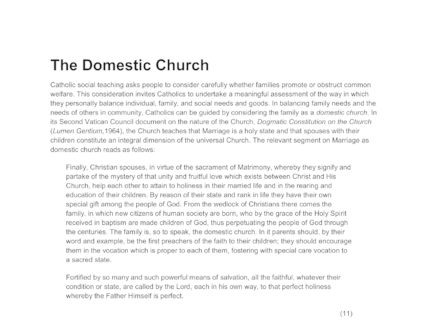
This article is part of the Living in Christ series. It discusses the domestic church, that is, the home of Catholic families, and uses Church documents to affirm the important role families play in the life of the Church.
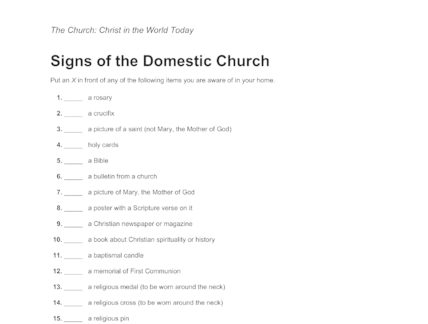
This activity is part of the Living in Christ Series. Students can identify various items that might be found in the "Domestic Church" - that is, the Christian home and family.
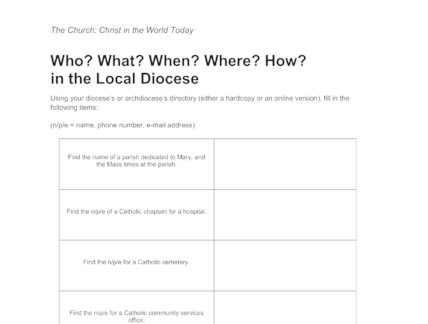
This activity is part of the Living in Christ Series. Students are asked to familiarize themselves various places and people in their diocese and archdiocese.
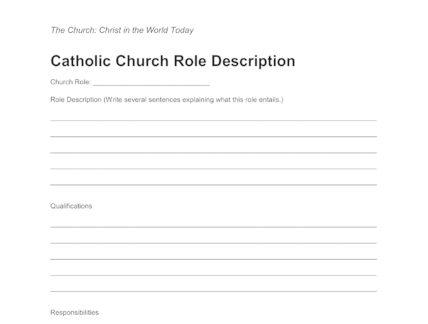
This activity is part of the Living in Christ Series. It is a short answer activity that discusses the various roles of different people in the Catholic Church, including their responsibilities and qualifications.
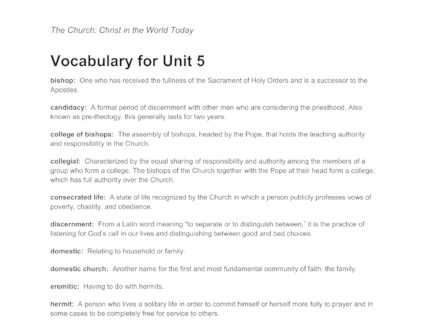
This vocabulary list is part of the Living in Christ Series. Students may use it as a reference for key theological terms to know.
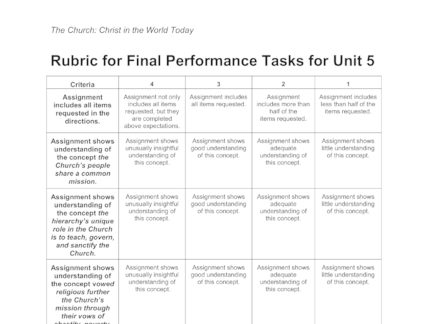
This rubric is part of the Living in Christ Series. It serves as a guide for assessing students on projects about the Catholic Church, especially the various vocational roles that members of the Church may serve.
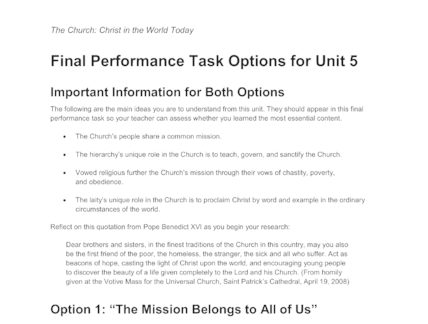
This resource is part of the Living in Christ Series. If offers various project ideas for students who have recently studied eccesiology, especially the roles of the hierarchy, the vowed religious, and the laity.
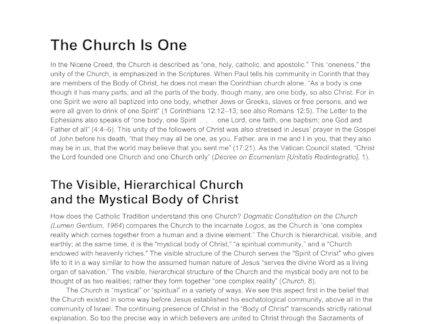
This article is part of the Living in Christ Series. It offers an overview of the 4 marks of the Catholic Church, focusing especially on the characteristic of One.
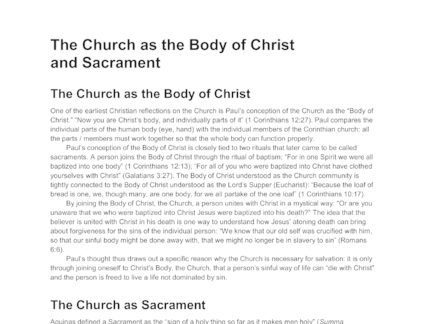
This article is from the Living in Christ Series. It offers an overview of two images of the Catholic Church: the Church as the Body of Christ, and the Church as a Sacrament.
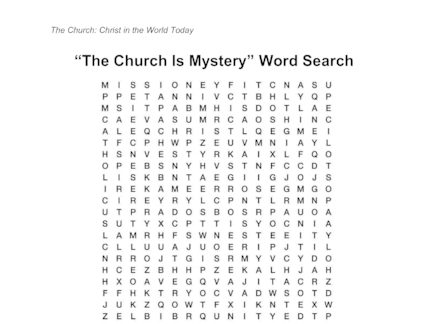
A word search on the mystery of the Church. Please note that this document is only available as a PDF.
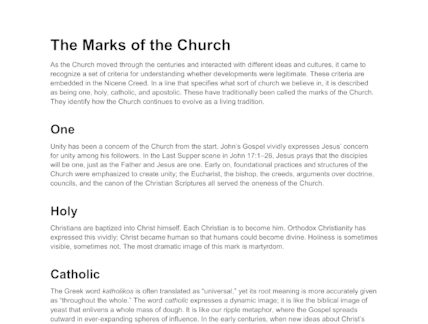
This article is part of the Living in Christ Series. It discusses the 4 marks of the Catholic Church: One, Holy, Catholic, and Apostolic.
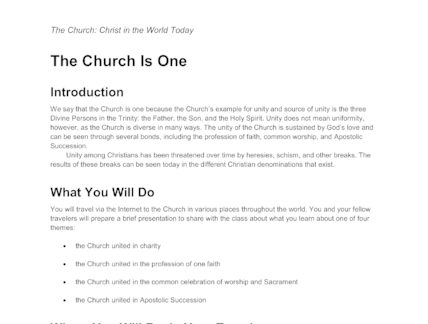
This project is part of the Living in Christ Series. Students are asked to do research on the mark of the Church as 'One' using various websites.
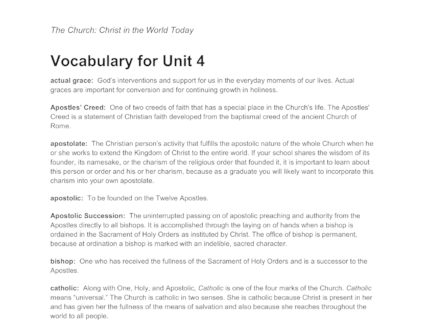
This vocabulary list is part of the Living in Christ Series. Students may use it as a reference for key theological terms to know.
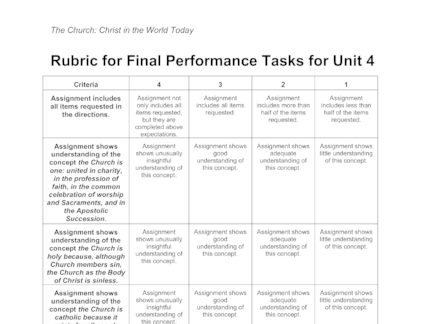
This rubric is part of the Living in Christ Series. It offers a guide for assessing students on projects about the Catholic Church, including themes of Apostolic Succession and the Body of Christ.
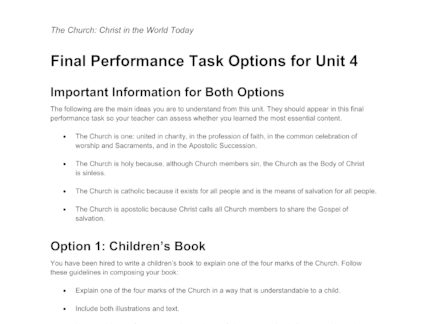
This resource is part o the Living in Christ Series. It offers ideas for final assessment activities for students studying apostolic succession, sacraments, and the four marks of the Church.
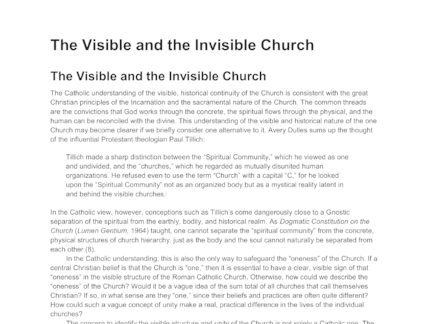
This article is part of the Living in Christ Series. It discusses the Catholic Church and the key features of its visible and invisible nature.
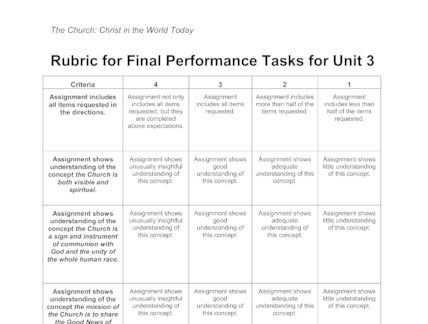
This rubric is part of the Living in Christ Series. It offers a guide for assessing students on projects that communicate key ideas about the Catholic Church and its nature.
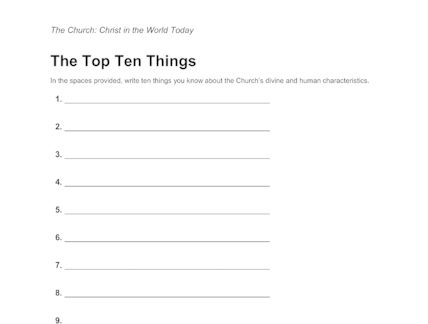
This activity is part of the Living in Christ Series. Students are asked to write down 10 things they know about the Catholic Church.
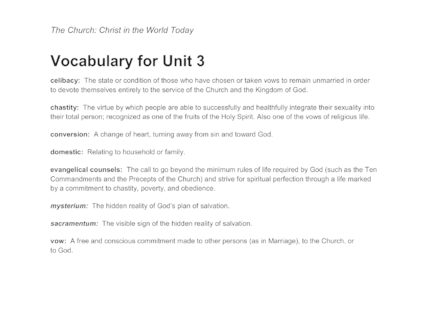
This vocabulary list is part of the Living in Christ Series. Students may use it as a reference for key theological terms to know.
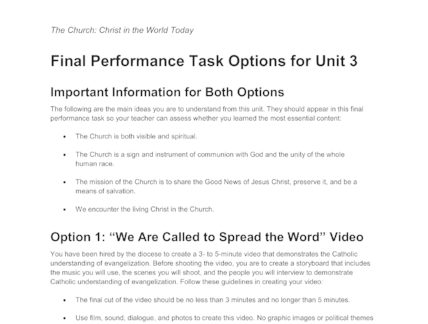
This resource is part of the Living in Christ Series. It offers various project ideas for students who have recently studied eccesiology, especially the nature and role of the Catholic Church.
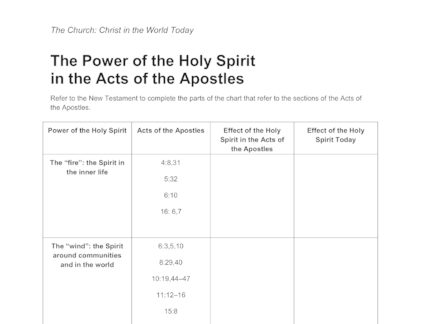
This worksheet is part of the Living in Christ Series. Students can explores the effects of the Holy Spirit in the Acts of the Apostles and today.
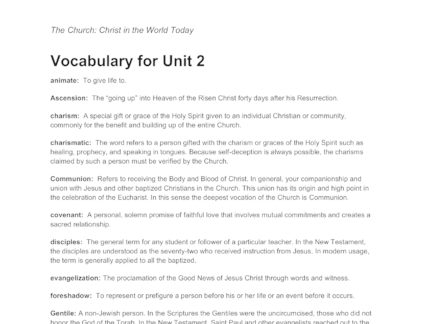
This vocabulary list is part of the Living in Christ Series. Students may use it as a reference for key theological terms to know.
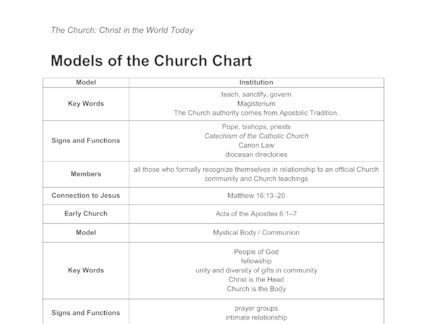
This chart is part of the Living in Christ Series. It is a great resource for understanding Avery Dulles' information on the Models of the Church in an organized chart.
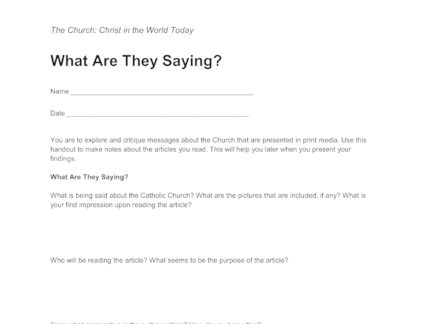
This activity is part of the Living in Christ Series. Students can read about the Catholic Church through various media outlets and answer these questions.
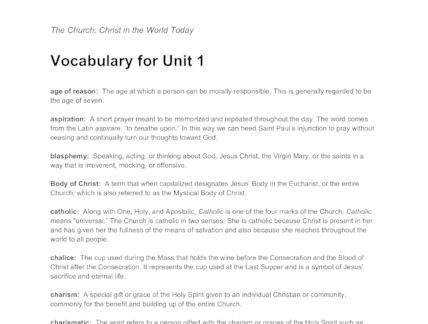
This vocabulary list is part of the Living in Christ Series. Students may use it as a reference for key theological terms to know.
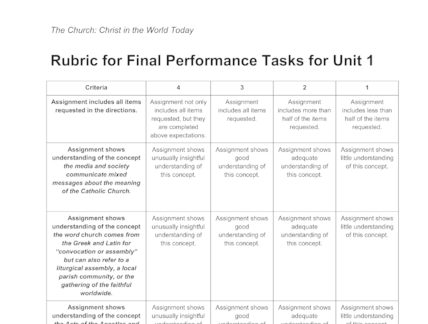
This rubric is part of the Living in Christ Series. It offers a guide for assessing students on projects that communicate various important ideas about the Church in the world today.
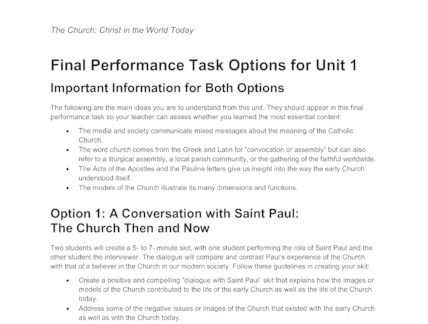
This resource is part of the Living in Christ Series. It offers ideas for assessing students who have recently studied the Church, including the scriptural accounts of early Church.
https://www.newadvent.org/cathen/12272b.htm
This PowerPoint is part of the Living in Christ Series. It discusses the relationship between the Catholic Church and the Bible, including information about sources, inspiration, and the role of the Magisterium.
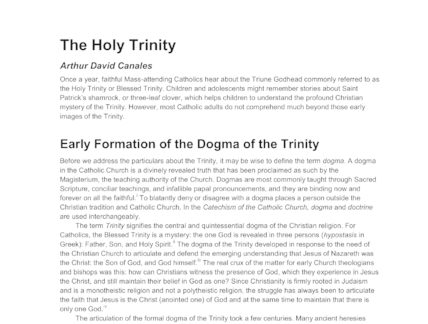
This article is part of the Living in Christ Series. Author Arthur David Canales offers an introduction to the Holy Trinity, including the dogma's historical development and key features.

This review is part of the Living in Christ Series. Students can review main ideas from studying the Church and ecclesiology.
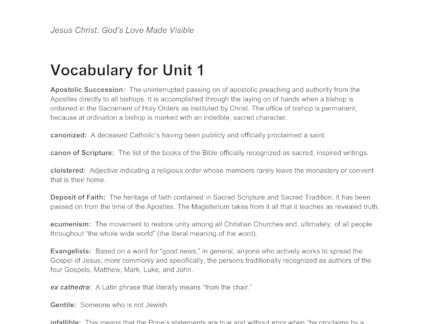
This vocabulary list is part of the Living in Christ Series. Students may use it as a reference for key theological terms to know.
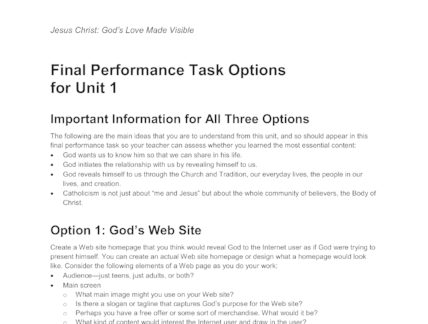
This resource is part of the Living in Christ Series. It offers ideas for final assessment projects for students studying Christology, including revelation, the Church, and tradition.
"Grace and peace in abundance to all of you! In my soul there are two contrasting sentiments in these hours. On the one hand, a sense of inadequacy and human turmoil for the responsibility entrusted to me yesterday as the …
Lord God, Father, Son and Holy Spirit, We lift up in prayer Pope Francis, The successor of Peter, The Bishop of Rome, Our Holy Father, The Vicar of Christ on Earth. He has been called to lead your Church. Strengthen …
Preparation - Prior to the beginning of prayer, you may select three young people to assist: a presider and two readers. - You will notice that the response to the Litany of the Saints is in both English and Latin. …
Cardinal Joseph Ratzinger, former prefect of the Congregation for the Doctrine of the Faith, President of the Pontifical Biblical Commission and of the International Theological Commission, Dean of the College of Cardinals, was born on April 16, 1927 in Marktl …
Must--Should--Can Instructions: Check all the responsibilities you believe a pope must do in the MUST column, the responsibilities he should do in the SHOULD column, and the responsibilities he can do in the CAN column. # Responsibility MUST SHOULD CAN …
OVERVIEW This is a youth catechetical session intended to lead young people to an understanding of Pope John Paul II's life, ministry, general papal responsibilities, and the procedure for electing a new pontiff. It can be used in a …
Choosing a new pope is somewhat of a mystery to people. In the early Church, a pope was elected not only by the bishops but also by the clergy and the laity. In later years, only the bishops took part …
These activities are easily adapted for family members at home. When gathered for a meal, or for the specific purpose of these activities, family members can do one activity, a couple, or all of them, depending on the amount of time …
What is the pope? The pope is the bishop of the Church of Rome, Italy. Because of the importance of Rome, Tradition recognizes the pope as the supreme pastor of all Christians. Why is the Church of Rome so important? …
The term pope comes from the Greek work pappas, or the Latin word papa, both of which mean "father." The pope's official titles include bishop of Rome, vicar of Jesus Christ, successor of the prince of the Apostles, supreme pontiff …
Saint John Paul II was born Karol Josef Wojtyla (Voy-tee-wah) on May 18, 1920, in Wadowice (Vah-do-vee-juh), Poland, a small city just outside Krakow. He was the third and youngest child of Karol Wojtyla Sr., a lieutenant in Poland's army, …
Catholicism is a remarkably rich religion, characterized by a complex tapestry of beliefs, practices, values, rituals, traditions, and more. When viewed "from the outside"--that is, by those who do not share its communal life--Catholicism is probably most frequently identified by …
Many of us have been raised in the Church, but why do we remain Catholic? This author shares her favorite reasons and invites you to consider your own. “DO YOU ALSO WANT TO LEAVE?“ (JOHN 6:67). When Jesus first asked …
For a couple of years, Saint Mary's Press sponsored a listserv discussion group online. Discussions on a variety of topics were pursued via e-mail. In this article I hope to summarize some of the highlights from postings on the timely …